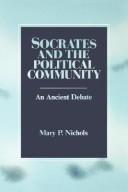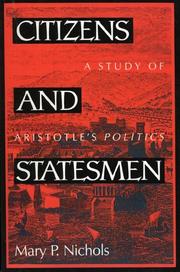| Listing 1 - 8 of 8 |
Sort by
|

ISBN: 0847689891 Year: 1998 Publisher: Lanham, Md. Rowman & Littlefield
Abstract | Keywords | Export | Availability | Bookmark
 Loading...
Loading...Choose an application
- Reference Manager
- EndNote
- RefWorks (Direct export to RefWorks)
For too long, the films of Woody Allen have been interpreted as expressions of deconstructionism, nihilism, and postmodern angst. In this pathbreaking new book, distinguished writer Mary P. Nichols challenges these assumptions by arguing that Allen's entire body of work, from Play It Again, Sam to Mighty Aphrodite, is actually an attempt to explore and reconcile the tension between art and life. As witty and complex as its subject, Reconstructing Woody shows why Allen, despite his recent personal turmoil, is immensely concerned with human ethics, goodness, and virtue. [publisher's description]
Allen, Woody --- Criticism and interpretation. --- Criticism and interpretation --- Allen, Woody, --- Konigsberg, Allen Stewart, --- Konigsberg, Allan Stewart, --- Allen, Heywood, --- Allen, Vudi, --- Ален, Вудзі, --- Alen, Vudzi, --- Алън, Уди, --- Alŭn, Udi, --- Кьонигсберг, Алън Стюарт, --- Konigsberg, Alŭn Sti︠u︡art, --- Αλεν, Γούντι, --- Alen, Gounti, --- Κένιγκσμπεργκ, Αλεν Στιούαρτ, --- Keninksmpernk, Alen Stiouart, --- Аллен, Вуди, --- Aellŏn, Udi, --- 앨런, 우디, --- Alen, Ṿudi, --- Allens, Vudijs, --- Konigsbergs, Elens Stjuarts, --- Ален, Вуди, --- Кенигсберг, Ален Стјуарт, --- Kenigsberg, Alen Stjuart, --- ウディ・アレン, --- Aren, Udi, --- Конигсберг, Аллен Стюарт, --- Konigsberg, Allen Sti︠u︡art, --- Аллен, Вуді, --- Коніґсберґ, Аллен Стюарт, --- עלען, וואדי, --- 伍迪·艾伦, --- Ailun, Wudi,

ISBN: 0887063969 Year: 1987 Publisher: Albany (N.Y.) : State university of New York press,
Abstract | Keywords | Export | Availability | Bookmark
 Loading...
Loading...Choose an application
- Reference Manager
- EndNote
- RefWorks (Direct export to RefWorks)
Political science --- History. --- History --- Socrates --- Socrate --- Socrates Constantinopolitanus Scholasticus --- Political and social views. --- Sokrates
Book
ISBN: 0801455588 9780801455582 080145316X 9780801453168 1336284250 080145557X 9781336284258 9780801455575 Year: 2015 Publisher: Ithaca ; London : Cornell University Press,
Abstract | Keywords | Export | Availability | Bookmark
 Loading...
Loading...Choose an application
- Reference Manager
- EndNote
- RefWorks (Direct export to RefWorks)
In Thucydides and the Pursuit of Freedom, Mary P. Nichols argues for the centrality of the idea of freedom in Thucydides' thought. Through her close reading of his History of the Peloponnesian War, she explores the manifestations of this theme. Cities and individuals in Thucydides' history take freedom as their goal, whether they claim to possess it and want to maintain it or whether they desire to attain it for themselves or others. Freedom is the goal of both antagonists in the Peloponnesian War, Sparta and Athens, although in different ways. One of the fullest expressions of freedom can be seen in the rhetoric of Thucydides' Pericles, especially in his famous funeral oration. More than simply documenting the struggle for freedom, however, Thucydides himself is taking freedom as his cause. On the one hand, he demonstrates that freedom makes possible human excellence, including courage, self-restraint, deliberation, and judgment, which support freedom in turn. On the other hand, the pursuit of freedom, in one's own regime and in the world at large, clashes with interests and material necessity, and indeed the very passions required for its support. Thucydides' work, which he himself considered a possession for all time, therefore speaks very much to our time, encouraging the defense of freedom while warning of the limits and dangers in doing so. The powerful must defend freedom, Thucydides teaches, but beware that the cost not become freedom itself.
Liberty. --- Civil liberty --- Emancipation --- Freedom --- Liberation --- Personal liberty --- Thucydides --- Thucydides. --- Thucydide --- Thukydides --- Thoukudides --- Political and social views. --- Liberty --- Democracy --- Natural law --- Political science --- Equality --- Libertarianism --- Social control --- E-books --- Tucidide --- Fukidid --- Tucídides --- Thoukydidēs --- תוקידידיס --- Θουκυδίδης
Book
ISBN: 9780521148832 9780521899734 9780511586583 9780511480805 0511480806 0521899737 9780511476150 0511476159 0521148839 1107202493 1282318063 9786612318061 0511480008 0511479123 0511477600 0511586582 Year: 2009 Publisher: Cambridge Cambridge University Press
Abstract | Keywords | Export | Availability | Bookmark
 Loading...
Loading...Choose an application
- Reference Manager
- EndNote
- RefWorks (Direct export to RefWorks)
In Socrates on Friendship and Community, Mary P. Nichols addresses Kierkegaard's and Nietzsche's criticism of Socrates and recovers the place of friendship and community in Socratic philosophizing. This approach stands in contrast to the modern philosophical tradition, in which Plato's Socrates has been viewed as an alienating influence on Western thought and life. Nichols' rich analysis of both dramatic details and philosophic themes in Plato's Symposium, Phaedras, and Lysis shows how love finds its fulfilment in the reciprocal relation of friends. Nichols also shows how friends experience another as their own and themselves as belonging to another. Their experience, she argues, both sheds light on the nature of philosophy and serves as a standard for a political life that does justice to human freedom and community.
Socrates --- Friendship. --- Amitié --- Amitié --- Friendship --- Love --- Affection --- Emotions --- First loves --- Intimacy (Psychology) --- Friendliness --- Conduct of life --- Interpersonal relations --- Plato. --- Kierkegaard, Søren. --- Nietzsche, Friedrich Wilhelm --- Nietzsche, Friedrich --- Nietzsche, Friederich --- Kierkegaard, Søren --- Anti-climacus --- H. H. --- Socrate --- Socrates Constantinopolitanus Scholasticus --- Love. --- Socrates. --- Nietzsche, Friedrich Wilhelm, --- Kierkegaard, Søren, --- Amour --- Arts and Humanities --- History --- Anti-Climacus, --- Bogbinder, Hilarius, --- Chʻi-kʻo-kuo, --- Climacus, Johannes, --- Constantius, Constantin, --- Eremita, Victor, --- Haufniensis, Vigilius, --- Johannes, Climacus, --- Johannes de Silentio, --- Kʹerkegor, Seren, --- Kierkegaard, S. --- Kierkegaard, Severino, --- Kierkegaard, Søren Aabye, --- K'i︠e︡rkegor, Sʹoren, --- Kīrkajūrd, Sūrīn, --- Kirkegaard, Soeren, --- Kirkegor, Seren, --- Ḳirḳegor, Sern, --- Kirkegors, Sērens, --- Kirukegōru, Søren, --- Kjerkegor, Seren, --- Kʻo-erh-kʻai-ko-erh, --- Notabene, Nicolaus, --- Silentio, Johannes de, --- Sūrīn Kīrkajūrd, --- Victor, Eremita, --- Vigilius, Haufniensis, --- קירקגור, סרן --- קירקגור, סורן --- קירקגור, סירן --- קירקגור, סירן, --- קירקגורד, סרן, --- 克尓凯郭尓, --- Sokrates --- Sokrat, --- Sokrates, --- Suqrāṭ, --- Su-ko-la-ti, --- Sugeladi, --- Sokuratesu, --- Sākreṭīsa, --- Socrate, --- سقراط, --- Σωκράτης, --- Kierkegaard, Sren,
Book
ISBN: 9780268205454 Year: 2023 Publisher: Notre Dame University of Notre Dame press
Abstract | Keywords | Export | Availability | Bookmark
 Loading...
Loading...Choose an application
- Reference Manager
- EndNote
- RefWorks (Direct export to RefWorks)

ISBN: 0847677028 0847677036 Year: 1992 Publisher: Totowa Rowman & Littlefield
Abstract | Keywords | Export | Availability | Bookmark
 Loading...
Loading...Choose an application
- Reference Manager
- EndNote
- RefWorks (Direct export to RefWorks)
Digital
ISBN: 9780801455582 Year: 2015 Publisher: Ithaca, N.Y. Cornell University Press
Abstract | Keywords | Export | Availability | Bookmark
 Loading...
Loading...Choose an application
- Reference Manager
- EndNote
- RefWorks (Direct export to RefWorks)
Book
ISBN: 9780268205478 0268205477 9780268205447 0268205442 Year: 2023 Publisher: Notre Dame, Indiana : University of Notre Dame,
Abstract | Keywords | Export | Availability | Bookmark
 Loading...
Loading...Choose an application
- Reference Manager
- EndNote
- RefWorks (Direct export to RefWorks)
Aristotle's Discovery of the Human offers a fresh, illuminating, and accessible analysis of one of the Western philosophical tradition's most important texts.In Aristotle's Discovery of the Human, noted political theorist Mary P. Nichols explores the ways in which Aristotle brings the gods and the divine into his "philosophizing about human affairs" in his Nicomachean Ethics. Her analysis shows that, for Aristotle, both piety and politics are central to a flourishing human life. Aristotle argues that piety provides us not only an awareness of our kinship to the divine, and hence elevates human life, but also an awareness of a divinity that we cannot entirely assimilate or fathom. Piety therefore supports a politics that strives for excellence at the same time that it checks excess through a recognition of human limitation.Proceeding through each of the ten books of the Ethics, Nichols shows that this prequel to Aristotle's Politics is as theoretical as it is practical. Its goal of improving political life and educating citizens and statesmen is inseparable from its pursuit of the truth about human beings and their relation to the divine. In the final chapter, which turns to contemporary political debate, Nichols's suggestion of the possibility of supplementing and deepening liberalism on Aristotelian grounds is supported by the account of human nature, virtue, friendship, and community developed throughout her study of the Ethics.
| Listing 1 - 8 of 8 |
Sort by
|

 Search
Search Feedback
Feedback About UniCat
About UniCat  Help
Help News
News